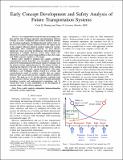| dc.contributor.author | Fleming, Cody H. | |
| dc.contributor.author | Leveson, Nancy G | |
| dc.date.accessioned | 2018-05-10T18:38:29Z | |
| dc.date.available | 2018-05-10T18:38:29Z | |
| dc.date.issued | 2016-12 | |
| dc.date.submitted | 2016-06 | |
| dc.identifier.issn | 1524-9050 | |
| dc.identifier.issn | 1558-0016 | |
| dc.identifier.uri | http://hdl.handle.net/1721.1/115299 | |
| dc.description.abstract | As transportation systems become increasingly complex and the roles of human operators and autonomous software continue to evolve, traditional safety-related analytical methods are becoming inadequate. Traditional hazard analysis tools are based on an accident causality model that does not capture many of the complex behaviors found in modern engineered systems. Additionally, these traditional approaches are most effective during the late stages of system development, when detailed design information is available. However, system safety cannot be cost-effectively assured by discovering problems at these late stages and adding expensive updates to the design. Rather, safety should be designed into complex intelligent transportation systems from their very conception, which can be achieved by integrating powerful hazard analysis techniques into the general systems engineering process. The primary barrier to achieving this objective is the lack of effectiveness of the existing analytical tools during early concept development. This paper introduces a new technique, which is based on a systems- and control-theoretic model of accident causality that can capture behaviors that are prevalent in these complex software-intensive systems. The goals are to (1) develop rigorous systematic tools for the analysis of future concepts to identify potentially hazardous scenarios and undocumented assumptions and to (2) extend these tools to assist stakeholders in the development of concepts using a safety-driven approach. Current work focuses on air transportation, but future goals of this research are to extend to and generalize all modes of transportation. | en_US |
| dc.language.iso | en_US | |
| dc.publisher | Institute of Electrical and Electronics Engineers (IEEE) | en_US |
| dc.relation.isversionof | http://dx.doi.org/10.1109/TITS.2016.2561409 | en_US |
| dc.rights | Creative Commons Attribution-Noncommercial-Share Alike | en_US |
| dc.rights.uri | http://creativecommons.org/licenses/by-nc-sa/4.0/ | en_US |
| dc.source | Prof. Leveson | en_US |
| dc.title | Early Concept Development and Safety Analysis of Future Transportation Systems | en_US |
| dc.type | Article | en_US |
| dc.identifier.citation | Fleming, Cody H. and Nancy G. Leveson. “Early Concept Development and Safety Analysis of Future Transportation Systems.” IEEE Transactions on Intelligent Transportation Systems 17, 12 (December 2016): 3512–3523 © 2016 IEEE | en_US |
| dc.contributor.department | Massachusetts Institute of Technology. Department of Aeronautics and Astronautics | |
| dc.contributor.approver | Leveson, Nancy G | en_US |
| dc.contributor.mitauthor | Fleming, Cody H. | |
| dc.contributor.mitauthor | Leveson, Nancy G | |
| dc.relation.journal | IEEE Transactions on Intelligent Transportation Systems | en_US |
| dc.eprint.version | Author's final manuscript | en_US |
| dc.type.uri | http://purl.org/eprint/type/JournalArticle | en_US |
| eprint.status | http://purl.org/eprint/status/PeerReviewed | en_US |
| dspace.orderedauthors | Fleming, Cody H.; Leveson, Nancy G. | en_US |
| dspace.embargo.terms | N | en_US |
| dc.identifier.orcid | https://orcid.org/0000-0001-6335-471X | |
| dc.identifier.orcid | https://orcid.org/0000-0001-6294-8890 | |
| mit.license | OPEN_ACCESS_POLICY | en_US |
